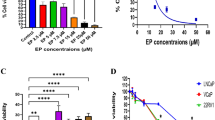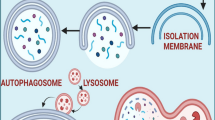Abstract
Brevilin A possesses inhibitory effects on the development of prostate cancer (PCa); however, the underlying mechanism remains unclear. The present work aims to analyze how Brevilin A regulates PCa cell malignancy. RNA expression of paired box 5 (PAX5) and SRY-box transcription factor 4 (SOX4) was analyzed by quantitative real-time polymerase chain reaction. Protein expression of PAX5, SOX4, and nuclear proliferation marker (Ki67) was detected by western blotting or immunohistochemistry assay. The viability, proliferation, apoptosis, and migratory and invasive abilities of PCa cells were investigated by cell counting kit-8 (CCK-8), 5-Ethynyl-2’-deoxyuridine (EdU), flow cytometry, and transwell assays, respectively. The association between PAX5 and SOX4 was identified by dual-luciferase reporter assay and chromatin immunoprecipitation assay. Xenograft mouse model assay was used to reveal the effect of Brevilin A on tumor tumorigenesis in vivo. PAX5 and SOX4 expression were upregulated in PCa tissues and cells relative to normal prostate tissues and human prostate epithelial cells. Brevilin A treatment inhibited PAX5 protein expression in PCa cells. Additionally, Brevilin A inhibited proliferation, migration and invasion and induced apoptosis of PCa cells, whereas these effects were attenuated after PAX5 overexpression. SOX4 was transcriptionally activated by PAX5, and its introduction partially relieved the inhibitory effects of PAX5 knockdown on PCa cell malignancy. Moreover, Brevilin A delayed tumor formation in vivo. Brevilin A inhibited PCa progression by regulating SOX4 expression in a PAX5-dependent manner, providing a promising anti-tumor drug for PCa.






Similar content being viewed by others
Availability of Data and Materials
The analyzed data sets generated during the present study are available from the corresponding author on reasonable request.
References
Wasim, S., Lee, S. Y., & Kim, J. (2022). Complexities of prostate cancer. International Journal of Molecular Sciences, 23(22), 14257.
Wang, G., Zhao, D., Spring, D. J., & DePinho, R. A. (2018). Genetics and biology of prostate cancer. Genes and Development., 32(17–18), 1105–1140.
Valdman, A., Nordenskjöld, A., Fang, X., et al. (2003). Mutation analysis of the BRG1 gene in prostate cancer clinical samples. International Journal of Oncology, 22(5), 1003–1007.
Daniyal, M., Siddiqui, Z. A., Akram, M., Asif, H. M., Sultana, S., & Khan, A. (2014). Epidemiology, etiology, diagnosis and treatment of prostate cancer. Asian Pacific journal of cancer prevention : APJCP., 15(22), 9575–9578.
Ohlmann, C. (2023). Hormone-sensitive prostate cancer. Urologie (Heidelberg, Germany)., 62(4), 345–346.
Teo, M. Y., Rathkopf, D. E., & Kantoff, P. (2019). Treatment of advanced prostate cancer. Annual Review of Medicine., 70, 479–499.
Evans, A. J. (2018). Treatment effects in prostate cancer. Modern Pathology., 31(S1), S110-121.
Chen, X., Du, Y., Nan, J., et al. (2013). Brevilin A, a novel natural product, inhibits janus kinase activity and blocks STAT3 signaling in cancer cells. PLoS ONE, 8(5), e63697.
Qu, Z., Lin, Y., Mok, D. K., Bian, Q., Tai, W. C., & Chen, S. (2020). Brevilin A, a natural sesquiterpene lactone inhibited the growth of triple-negative breast cancer cells via Akt/mTOR and STAT3 signaling pathways. OncoTargets and Therapy., 13, 5363–5373.
Khan, M., Maryam, A., Saleem, M. Z., et al. (2020). Brevilin A induces ROS-dependent apoptosis and suppresses STAT3 activation by direct binding in human lung cancer cells. Journal of Cancer., 11(13), 3725–3735.
You, P., Wu, H., Deng, M., Peng, J., Li, F., & Yang, Y. (2018). Brevilin A induces apoptosis and autophagy of colon adenocarcinoma cell CT26 via mitochondrial pathway and PI3K/AKT/mTOR inactivation. Biomedicine and Pharmacotherapy, 98, 619–625.
Liu, R., Qu, Z., Lin, Y., Lee, C. S., Tai, W. C., & Chen, S. (2019). Brevilin A induces cell cycle arrest and apoptosis in nasopharyngeal carcinoma. Frontiers in Pharmacology., 10, 594.
Lee, D., Kwak, H. J., Kim, B. H., et al. (2022). Brevilin A isolated from centipeda minima induces apoptosis in human gastric cancer cells via an extrinsic apoptotic signaling pathway. Plants (Basel, Switzerland)., 11(13), 1658.
You, P., Tang, L., Zhu, Y., & Tian, Y. (2023). Brevilin A shows an anti-tumor role in prostate cancer via the lncRNA H19/miR-194/E2F3 signaling pathway. Aging, 15(10), 4411–4428.
Gu, Z., Churchman, M. L., Roberts, K. G., et al. (2019). PAX5-driven subtypes of B-progenitor acute lymphoblastic leukemia. Nature Genetics., 51(2), 296–307.
Fouad, F. M., & Eid, J. I. (2023). PAX5 fusion genes in acute lymphoblastic leukemia: A literature review. Medicine, 102(20), e33836.
Leblanc, N., Harquail, J., Crapoulet, N., Ouellette, R. J., & Robichaud, G. A. (2018). Pax-5 inhibits breast cancer proliferation through MiR-215 up-regulation. Anticancer Research., 38(9), 5013–5026.
Wu, X., Xiao, Y., Zhou, Y., Zhou, Z., & Yan, W. (2019). LncRNA FOXP4-AS1 is activated by PAX5 and promotes the growth of prostate cancer by sequestering miR-3184-5p to upregulate FOXP4. Cell Death and Disease., 10(7), 472.
Zhang, N., Li, Z., Bai, F., & Zhang, S. (2019). PAX5-induced upregulation of IDH1-AS1 promotes tumor growth in prostate cancer by regulating ATG5-mediated autophagy. Cell Death and Disease., 10(10), 734.
Penzo-Méndez, A. I. (2010). Critical roles for SoxC transcription factors in development and cancer. The International Journal of Biochemistry and Cell Biology., 42(3), 425–428.
Ahmed, E. A., & Alzahrani, A. M. (2023). SOXC transcription factors as diagnostic biomarkers and therapeutic targets for arthritis. International Journal of Molecular Sciences., 24(4), 4215.
Liu, Y., Zeng, S., Jiang, X., Lai, D., & Su, Z. (2017). SOX4 induces tumor invasion by targeting EMT-related pathway in prostate cancer. Tumour biology: The Journal of the International Society for Oncodevelopmental Biology and Medicine., 39(5), 1010428317694539.
Wang, L., Zhang, J., Yang, X., et al. (2013). SOX4 is associated with poor prognosis in prostate cancer and promotes epithelial–mesenchymal transition in vitro. Prostate Cancer and Prostatic Diseases., 16(4), 301–307.
Huang, D. W., Huang, M., Lin, X. S., & Huang, Q. (2017). CD155 expression and its correlation with clinicopathologic characteristics, angiogenesis, and prognosis in human cholangiocarcinoma. OncoTargets and Therapy., 10, 3817–3825.
Ren, X., Chen, X., Zhang, X., et al. (2021). Immune microenvironment and response in prostate cancer using large population cohorts. Frontiers in Immunology., 12, 686809.
Lee, M. M., Chan, B. D., Wong, W. Y., et al. (2020). Synthesis and evaluation of novel anticancer compounds derived from the natural product Brevilin A. ACS Omega, 5(24), 14586–14596.
Su, T., Wang, Y. P., Wang, X. N., et al. (2020). The JAK2/STAT3 pathway is involved in the anti-melanoma effects of brevilin A. Life Sciences., 241, 117169.
Wei, B., Hao, Z., Zheng, H., Qin, Y., Zhao, F., & Shi, L. (2022). Brevilin A inhibits VEGF-induced angiogenesis through ROS-dependent mitochondrial dysfunction. Oxidative Medicine and Cellular Longevity., 2022, 5888636.
Yu, J., Kim, S., Lee, N., et al. (2021). Pax5 negatively regulates osteoclastogenesis through downregulation of Blimp1. International Journal of Molecular Sciences., 22(4), 2097.
Benzina, S., Beauregard, A. P., Guerrette, R., et al. (2017). Pax-5 is a potent regulator of E-cadherin and breast cancer malignant processes. Oncotarget, 8(7), 12052–12066.
Benzina, S., Harquail, J., Guerrette, R., et al. (2016). Breast cancer malignant processes are regulated by Pax-5 through the disruption of FAK signaling pathways. Journal of Cancer., 7(14), 2035–2044.
Harquail, J., LeBlanc, N., Landry, C., Crapoulet, N., & Robichaud, G. A. (2018). Pax-5 inhibits NF-κB activity in breast cancer cells through IKKε and miRNA-155 effectors. Journal of Mammary Gland Biology and Neoplasia., 23(3), 177–187.
Sun, D., Li, F., Liu, L., et al. (2022). PSMA3-AS1 induced by transcription factor PAX5 promotes cholangiocarcinoma proliferation, migration and invasion by sponging miR-376a-3p to up-regulate LAMC1. Aging, 14(1), 509–525.
Liu, S. L., Cai, C., Yang, Z. Y., et al. (2021). DGCR5 is activated by PAX5 and promotes pancreatic cancer via targeting miR-3163/TOP2A and activating Wnt/β-catenin pathway. International Journal of Biological Sciences., 17(2), 498–513.
Song, H. R., Guo, X. B., Duan, Y., Meng, H. Y., & Wang, Z. Y. (2021). PAX5-induced upregulation of LINC01194 exerts oncogenic properties by regulating GOLPH3 expression via miR-486-5p in prostate cancer. European Review for Medical and Pharmacological Sciences., 25(6), 2528–2541.
Liu, H., Wu, Z., Zhou, H., et al. (2019). The SOX4/miR-17-92/RB1 axis promotes prostate cancer progression. Neoplasia (New York, NY)., 21(8), 765–776.
Funding
None.
Author information
Authors and Affiliations
Contributions
Conceptualization and methodology: Jianqun Fan and Desheng Chen; formal analysis and data curation: Zhen Nie, Peng Chen, and Desheng Chen; validation and investigation: Xinxiang Que and Jianqun Fan; writing—original draft preparation and writing—review and editing: Xinxiang Que, Jianqun Fan, and Desheng Chen; approval of final manuscript: all authors.
Corresponding author
Ethics declarations
Conflict of interest
The authors declare that they have no financial or non-financial conflicts of interest.
Ethics approval and consent to participate
The present study was approved by the ethical review committee of Xiantao First People’s Hospital. Written informed consent was obtained from all enrolled patients.
Consent for publication
Patients agree to participate in this work.
Additional information
Publisher's Note
Springer Nature remains neutral with regard to jurisdictional claims in published maps and institutional affiliations.
Supplementary Information
Below is the link to the electronic supplementary material.
12033_2024_1183_MOESM1_ESM.tif
Supplementary file1 Figure S1 Analysis of weight between the treatment group and the control group throughout the experimental period (TIF 113 KB)
Rights and permissions
Springer Nature or its licensor (e.g. a society or other partner) holds exclusive rights to this article under a publishing agreement with the author(s) or other rightsholder(s); author self-archiving of the accepted manuscript version of this article is solely governed by the terms of such publishing agreement and applicable law.
About this article
Cite this article
Que, X., Fan, J., Chen, D. et al. Brevilin A Inhibits Prostate Cancer Progression by Decreasing PAX5-Activated SOX4. Mol Biotechnol (2024). https://doi.org/10.1007/s12033-024-01183-w
Received:
Accepted:
Published:
DOI: https://doi.org/10.1007/s12033-024-01183-w




